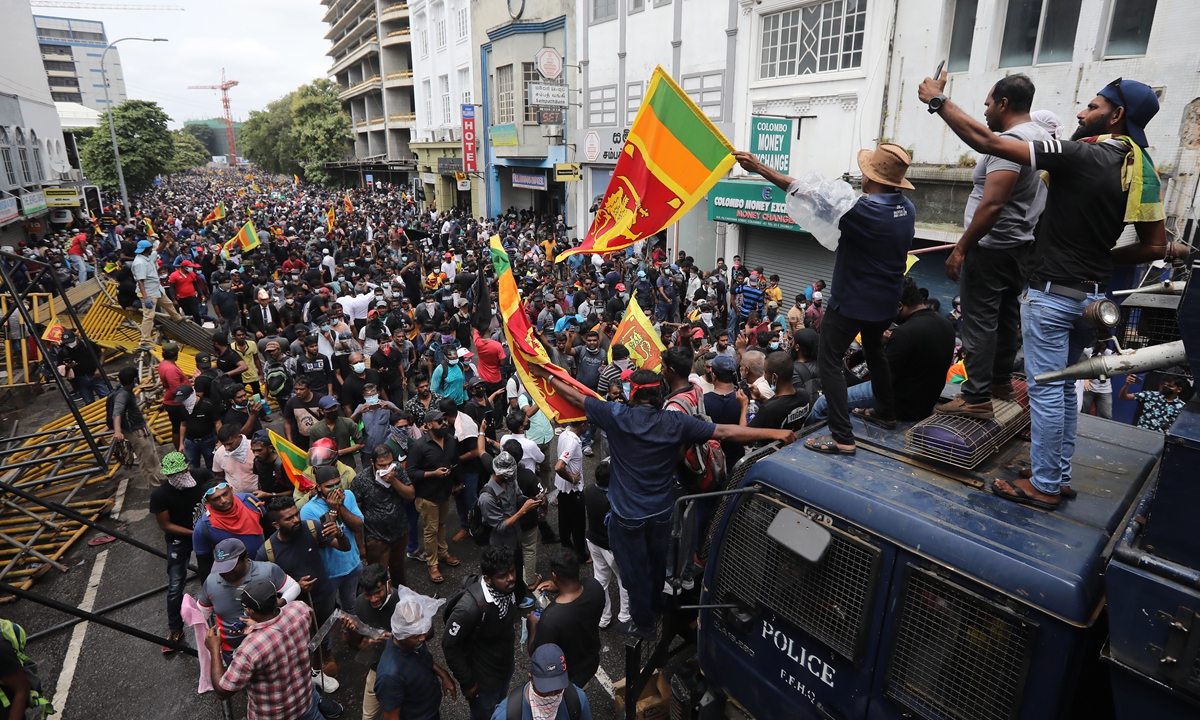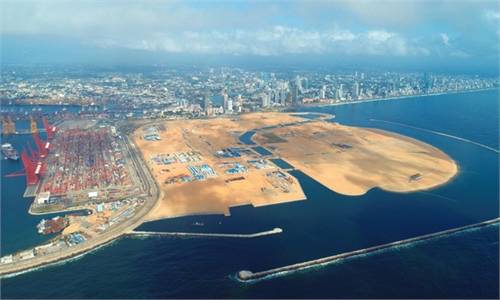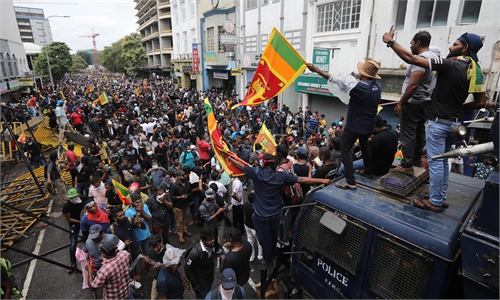US, West should not have twisted excitement toward Sri Lanka crisis: Global Times editorial

Protesters gather near the presidential palace in Colombo, Sri Lanka on July 9, 2022. Photo: IC
On Saturday, tens of thousands of protesters broke into the presidential residence in Sri Lanka's capital Colombo. President Gotabaya Rajapaksa announced that he would resign on July 13 after being chased from the residence. Prime Minister Ranil Wickremesinghe said he will leave office once a multi-party government is in place. There remains a question mark over to what extent the regime change can resolve the economic and social crisis that has plagued this South Asian country for more than half a year.This South Asian island nation of 22 million people is facing record inflation and shortages of fuel, food and medicine, and people's livelihood is in great difficulty. The Sri Lankan government had previously declared bankruptcy, becoming the first country to default on its foreign debt this century. In addition to the situation in Sri Lanka, there is another question that people are concerned about: Will there be another bankrupt country and who will it be?
In just a few years, Sri Lanka has grown from a middle-to-high-income country in South Asia to where it is today, which is undoubtedly the result of a combination of internal and external factors. The two major external factors are the COVID-19 pandemic which has hit the tourism industry hard, the pillar of Sri Lanka's economy and the second is the rise in energy and food prices caused by the conflict between Russia and Ukraine. From the perspective of internal factors, the relatively radical agricultural and economic policies launched by Sri Lanka in previous years makes the country difficult to resist the impact of external factors.
It can be seen that a country like Sri Lanka whose economy relies heavily on foreign exchange income is fragile in its ability to resist global economic risks, and the bankruptcy is caused by multiple factors. It has to be said that some countries in the West like the US are more interested in using the Sri Lanka crisis for geopolitical manipulation than they are willing to offer real assistance to the country. They look at Sri Lanka which is in crisis not with anxiety, but with twisted excitement.
Sri Lanka is already scarred and cannot bear the pressure and cost of becoming a geopolitical arena. Many research reports have repeatedly demonstrated that Sri Lanka's current debt crisis is not directly related to Chinese-funded infrastructure investment. Bilateral foreign debt to China only accounts for 10 percent of Sri Lanka's total outstanding foreign debt. Western countries' commercial creditors and multilateral financial institutions are responsible for Sri Lanka's foreign debt. They sold the debt to so-called vulture funds, which really exploited Sri Lanka's every penny. Therefore, discrediting China by accusing it of digging of the "debt trap" and even attacking the Belt and Road Initiative is not grounded.
Given Sri Lanka's experience, it is urgent to break the development dilemma of some developing countries. Just imagine it. If Sri Lanka gradually forms its own economic development system, it will be more able to resist risks when encountered with a harsh external economic environment. In fact, this has become the consensus of an increasing number of countries. As of the end of May 2022, China has signed more than 200 "Belt and Road" cooperation documents with 150 countries and 32 international organizations, and the circle of friends for the construction of the Belt and Road Initiative has been expanding, which strongly proves that cooperation is moving in the right direction.
Washington is well aware of this. The Trump administration's proposal of the "Blue Dot Network," claiming to promote the construction of high-quality regional infrastructure, the Biden administration's proposal to "Build Back Better World" in June 2021, and Biden' announcement this June during the G7 Summit that the bloc will mobilize about $600 billion for global infrastructure investment can all prove it. Strengthening infrastructure and enhancing endogenous power is the real key to cracking the development dilemma.
However, just because the Belt and Road Initiative underlines cooperation and joint construction rather than the leadership of the US and the West, some people in the US and the West have spared no effort to smear and undermine it.
As the global economy enters a time of crisis, the word "development" highlights a value even more precious than gold. The "national bankruptcy" crisis facing Sri Lanka is essentially triggered by global development and governance deficits. The regional security crisis exacerbated by the US and the West has deepened the global development crisis. We sincerely hope that the US and some countries in the West can restrain their geopolitical impulses to indulge in great power competition. They should give some space to their consciences, and give some time to development.


